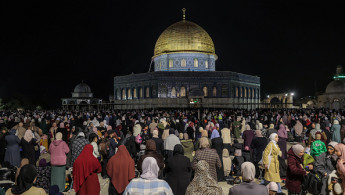Israel and Jordan 'agreed to ban sit-ins' at Al-Aqsa during Aqaba summit: reports
Israeli and Jordan officials agreed to ban sit-ins at the Al-Aqsa compound during the holy month of Ramadan at last month's Aqaba summit, according to anonymous sources who spoke to the Arabi21 news website.
The two countries reportedly agreed to restrict time spent by worshippers at Al-Aqsa during February's US-brokered Aqaba summit, which was roundly criticised at the time for failing to put meaningful pressure on Israel as it carried out deadly attacks in the occupied West Bank.
A source who spoke to Arabi 21 said: "At the Aqaba summit, it was agreed by Israeli and Jordanian security officials and the Jerusalem Waqf and Islamic Affairs Council that sit-ins would be banned at Al-Aqsa."
The source said that this would happen from the beginning of Ramadan.
Palestinian Muslims are routinely prevented from visiting Al-Aqsa throughout Ramadan, where extended periods of prayer in mosques are commonplace.
Muslim worshippers have faced regular harassment and detention by Israeli forces, particularly during Ramadan.
Many worshippers have responded by holding sit-ins at the mosque in order to protect it from attacks by Israeli police and settlers.
Arabi 21 reported that Israeli police had in recent days expelled Palestinians holding sit-ins inside the mosque.
The Jerusalem Waqf Council, which runs the Al-Aqsa Mosque and is affiliated with Jordan, said that sit-ins could still be held on Friday and Saturday, according to Arabi 21.
On Wednesday, dozens of Israeli settlers broke into the Al-Aqsa Mosque courtyard under heavy police guard.
Israeli settlers and extremists are allowed into the Al-Aqsa Mosque compound on a near-daily basis, despite a long-standing agreement preventing non-Muslim worship and rituals at the site, which is the third holiest in Islam.
Settlers have even announced their desire to carry out "animal sacrifices" inside the mosque compound to celebrate Passover next week, a move mosque leader Sheikh Omar Al-Kiswani described as "extremely dangerous".
Al-Aqsa, Islam's third-holiest site, has become a symbolic battleground for Israel's thriving radical settler political movement.
Far-right National Security Minister Itamar Ben-Gvir paid a controversial visit to Al-Aqsa in January, early in his time in officer, which Palestinian Prime Minister Mohammad Shtayyeh described as a bid to turn the site "into a Jewish temple".





 Follow the Middle East's top stories in English at The New Arab on Google News
Follow the Middle East's top stories in English at The New Arab on Google News


